Back in 2015/6 I was blessed to be the founder and CEO of the award winning startup, Cyber DriveWare. I believed winning startup competitions is an essential step on our way to success. Consequentially, winning was not just a mean to achieve a goal, but a goal of its own. I spent precious time on figuring out:
Is it possible to win startup competitions, and if yes, how!?
We then won high-profile startup competitions, including: Pioneers (Israeli/European), OTEC (Israeli/Chinese), and Kaspersky Startup Challenge (Russian/American). We won financial prizes, mentoring sessions, professional services, and beyond.
While financial prizes were important for us, they were not the most important thing we gained. Rather, it was the recognition. We were perceived by the risk-capital community as an investment-worthy startup. From that moment on, everything was different…
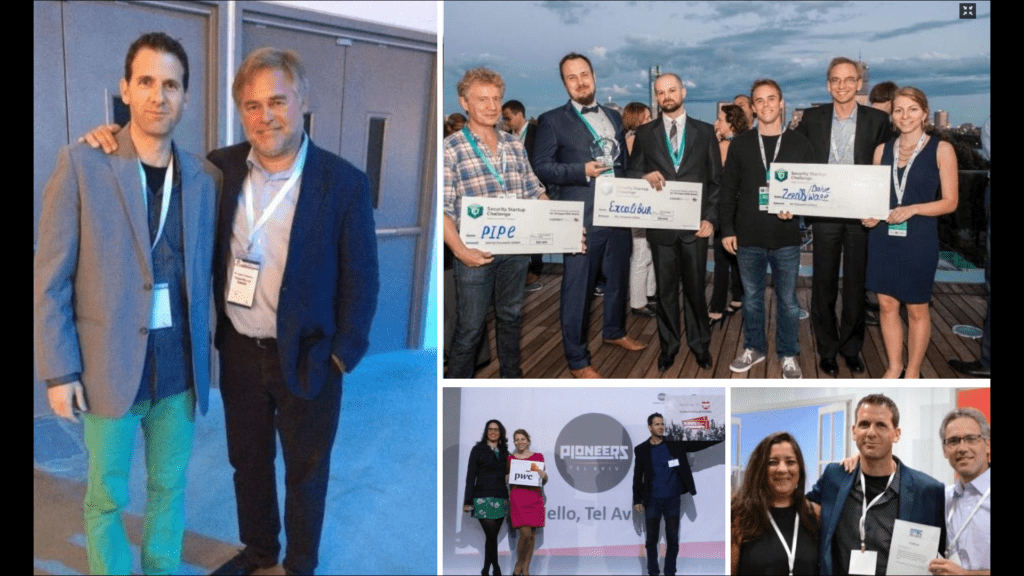
How did we win those competitions? What was our strategy, or secret sauce? Have we lost competitions as well? Was it risky? And how did we leverage winnings to receive term-sheets from investors from the US, UK, Singapore, and Israel?
Now in retrospective, I draw the formula which worked for us. I share with you our startup competition guide, or simply put: how to win startup competitions.
By the end of this series of articles, you’d become a master. You’d gain the expertise required to win startup competitions, all by yourself.
Let’s Go!
Intro: The Writer’s Credentials
Often I’m asked: why am I qualified to talk about how to win startup competitions? Indeed my company won those 3 competitions. But perhaps was I just lucky? Or even worse, maybe the startup won despite me, rather than thanks to me?
For starters, the 1st time I won a startup competition was back in 2001. As the photo below reveals, this was a competition by Oracle. Even earlier, back in 1999, I won “Best of Comdex Israel“. At the time, I was the product marketing manager of AMD in Israel.
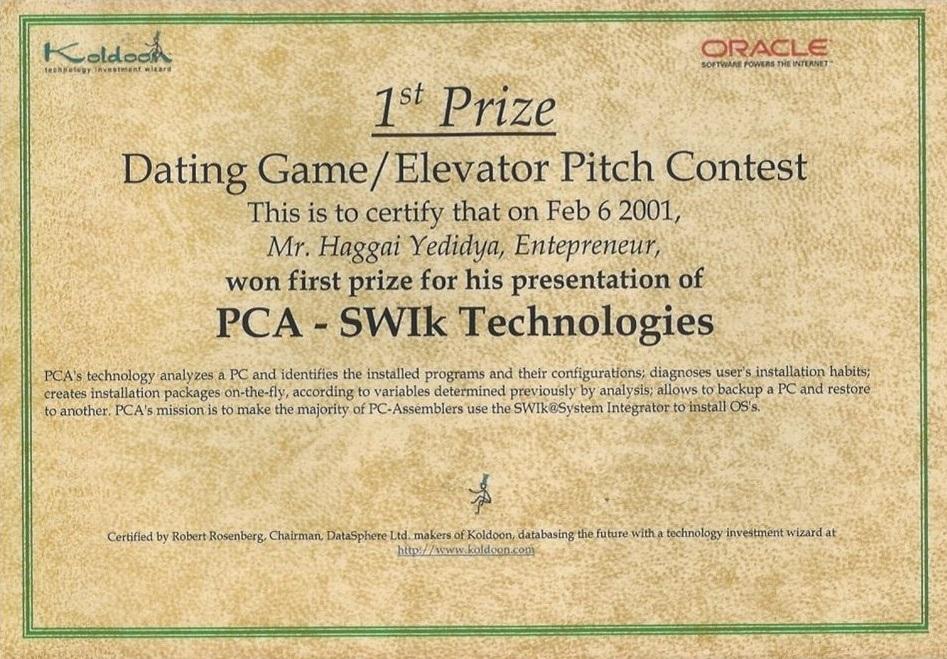
Throughout the years, I’ve competed tens of competitions. Obviously, not always I won, but I’ve always tried to learn something…
Additionally, I’ve been a judge in local and international startup competitions; I’ve mentored startup companies which in turn, competed in startup competitions. I’ve even been the organizer and MC of startup competitions. Some of which were sponsored by Blumberg Capital or other VCs.
Whether I’m qualified not, is your call. I will herein share my true stories, life-experiences and insights…
What is a Startup Competition?
A startup competition is an event, a meetup. Possibly it’s part of a larger conference. As the name implies, startup competitions bring startups together, to compete against one another.
At many times, startup competitions are called Pitch Competition (e.g. Startup Pitch Competition) or Entrepreneurship Competition. At other times, startup competitions are an integral part of an accelerator program, such as the case with MassChallenge or Kaspersky Startup Challenge.
What does a startup competition look like? Where does the process of winning begin, where does it end, and what’s in between? We’d now review the key stages of winning.
In the 2nd article in the series, we’d learn to see startups from the eyes of the judges. We’d then learn how to target the judges sweet spots.
In the 3rd article, we’d review gimmicks and tricks to help us stand out and be memorable. Differentiating our startups is a key to winning!

So in order to get the longed-for winning, let’s start from the start…
Stage #1: Submitting an Application
To attend a competition, you’d have to submit an application. Such an application would likely consist of a deck (presentation), and an executive summary (2-pager). Most likely, you’d be required to upload your presentation (in a .PDF file format). The two-pager would likely have to be submitted by filling an online questionnaire.
More often than not, I’ve witnessed technical errors with submitting such forms. Be mentally prepared to fill-in the blanks twice, and waste an extra time….
Competing is normally not subject for an admission fee. However, you’d be required to share many of your trade secrets with the public. Or the least, with the competition’s organizers.
This is an acceptable risk in my opinion, even though I’ve attended competitions where I wondered: What’s behind this contest? Is it all about “stealing” business intelligence or trade secrets?
Stage #2 – Semi Finals: Presenting to the Screening Committee
In some startups competitions, finalists are selected only based on their decks or other written content. In other cases, videos may be submitted too.
At times, following the online submission, semi-finalists are required to present in person, in front of the screening committee. Such a committee may consist of the same people who’d judge the finals.
In the case of global competitions, meeting with the screening committee may take place online via Xoom, Skype or alike.

At one time, I spent about half a day, just to pitch in the semi-finals. What for, you ask? Well… Most of the time was spent on sitting and waiting…
If I wish to focus on the full half of the glass, then this was a great opportunity to engage with the committee’s personnel, i.e. with the judges.
I remember that once, I managed to charm the screening committee to such a high degree, that during the finals event, they made sure to share their appreciation toward us, with the judges. Our path to winning was paved. It wasn’t easy, but its much easier when you are marked as a candidate for winning, up first.
Stage #3 – The Finals: Presenting on Stage!
If you are elected as a finalists, you’d then be invited to present in the finals event, a public event. You’d naturally receive information regarding the event in advance, such as: what is expected of you; how much time does your presentation last; whether there is a Q&A session or not; how long should the whole event take; what are the prizes; when to arrive; how to deliver your deck (via flash drive, or email, PDF or PPT), etc.
Now you got some time to rehearse, meditate, and get yourself ready to the big day…

The competition day has arrived… You are just about to be… on stage! The large screen is behind you, you’re equipped with a wireless microphone backed by a sound system, there’s lots blinding lighting, you can barely see the crowd… Oh, and how can you forget the panel of established judges, sitting right next to you…
Usually you’d receive something like 3 to 7 minutes to pitch. That should be more than enough to effectively deliver your message. I’ve seen competitions where finalists presented for an entire 10-15 minutes (each!). But nowadays, people’s limited span of attention, pushes to a stricter limit…
Either way, you’d be told ahead of time how much time you receive to present. Make sure to use exactly all that time. Be precise. Being cut off, in the middle of a slide, is a no go! Unfortunately, I still see this issue occurring quite often…
Whether you present for 3 or 15 minutes, those would be your moments to shine 🙂 Bring your best energy on stage. Be rehearsed. master your presentation. Don’t say hmm… Amm… and don’t show stress or fear. Be confident. Be a million dollars, be yourself 🙂
Of course this not something you spontaneously pull off. Rather this comes as a result of rehearsing.
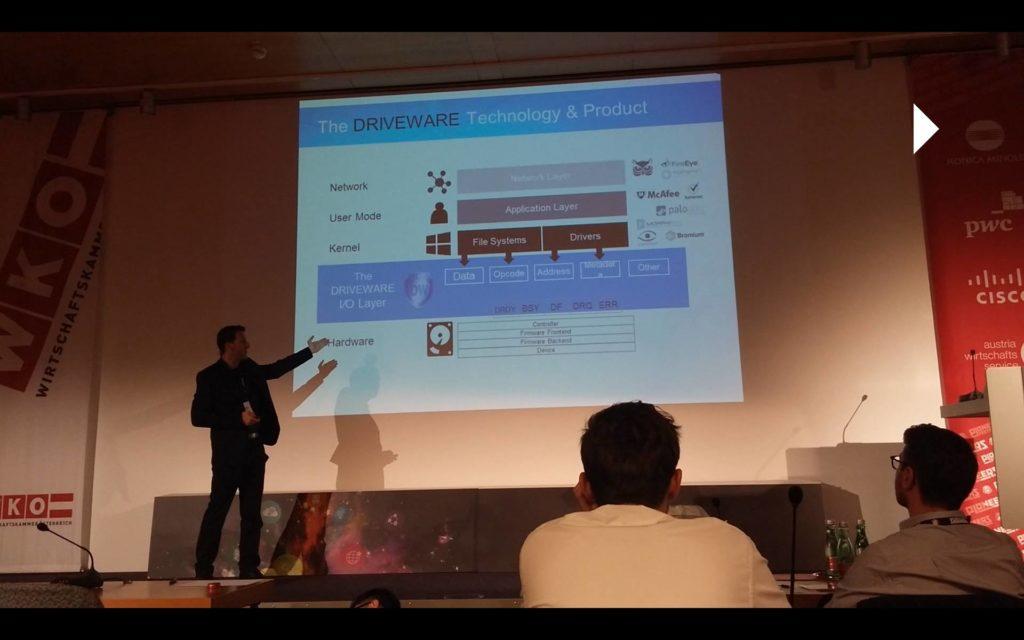
Stage #4: The Q&A Panel
Following your presentation, the panel of judges would likely ask you all sorts of questions: about your startup’s stage, team, pricing or business model, your vision, field of operation, whatever. Usually (but not always) the duration of the Q&A session is flexible. It can take anywhere between no time to even 5 minutes and even more!
Can I influence the questions I’d be asked, you wonder. You sure can!
One technique would be to mention untapped topics, throughout the presentation. Especially toward the end. Make it sound interesting. You could even mention that you wish you had time to elaborate on it…
The judges are likely to follow through and ask about exactly that!
You should be able to anticipate the questions you’d be asked. Master answers to those follow-up questions.
How could you prepare ahead of time to all those questions the judges may ask, you wonder? Well, that skill would come with time and experience, no worries… Once you’d present your startup over 100 (or 1,000 times), you’d know what questions are likely to follow…
As you learn to anticipate your pitch’s followup questions, prepare a slide for each answer. Rehearse your answers. When you’re on stage, switch to the extra-slides. Show yourself to be prepared. Impress by being comfortable, by being on top of it!
Stage #5: Handling the Judges Feedback
Following the Q&A session, or even during it, you may receive feedback. Some judges may appear rude, or stupid. Others may be kind or sharp. That is normal. Putting yourself up there is not meant for the ones with a weak heart…
Either way, never argue with the judges. Never make them wrong nor make yourself look right.
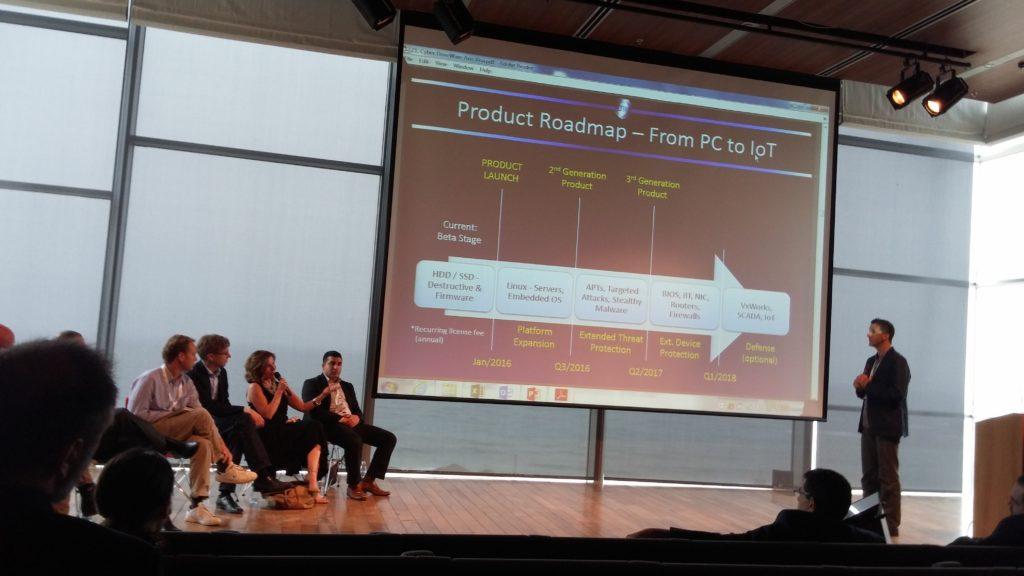
At this stage, you’re done talking. When you receive feedback, be highly attentive to what you are told. Even if you completely disagree, show yourself to be respectful to both: the feedback and the person sharing it with you.
Always thank the judges for sharing their thoughts with you. Mention that you’ll look into that; or say that you are aware of that flaw or issue. Then add that actions will be taken to address that.
You could even act on a feedback in a positive manner, such as by saying that this is spot on!
If the feedback or Q&A session indicate that the judges did not get your message, then take notes. Do not try to convince them. It’s game over. Rather than making things worse by arguing with the judges, learn from that. Go back to your home or office, get you shixxx together, and revise. Act on the feedback and better prepare yourself for your next competition.
The act of attentively and kindly accepting the judges feedback, will go a long way. Only reply, if you are given the stage again. Or perhaps, ask if you can add just one little clarification. Don’t push it.
Either way, make sure to create rapport with the judges. Show them your appreciation. Make them like you. Make them want to give you the crown. Not because your startup is flawless. But because they liked you, because you showed yourself to be a listener, a leader!
Stage #6: The Networking Session
Now that you (and your rivals) presented your startups, a networking session will probably take place. This is your chance to interact with everybody out there. Your chance to meet with investors, industry professionals or fellow startups.

Perhaps now that the presentation is behind you, it’s time to relax, on a coffee or a beer? After all, you’ve just burnt so many calories on stage. Seriously. You could use a moment just to relax or chill out by yourself…
Actually… Even if you feel a bit overwhelmed or exhausted, it’s not an excuse. Do your best to keep the adrenaline kicking. It ain’t over until the fat lady sings!
Until after the winners are announced, the competition is not over!
Your actions during the networking session, might be monitored by the judges. This could be your chance to further impress.
You may even be able to interact with the judges directly. This might be your opportunity to stand out, and make yourself more likable or memorable. This is your opportunity to put yourself ahead of everybody else!

Again, It Ain’t Over Until the Fat Lady Sings. Or in this case, until the networking session ends and the winners are announced… 🙂
A True Story: the 2-Man Bootstrap vs. Waze?
Back in 2011, there were very few startup competitions out there. I remember how I once paid a submission fee of… hmm… Was it $99? just to be screened for the competition. Eventually we made it all the way through the finals, Yay!
We, a bootstrap of 2 man, were then invited to present on stage in a an upscale event! As finalists, we competed against ~9 other startups, one of which was Waze. At the time, Waze raised over $37M! (later in 2013, Waze was acquired by Google for over $1B).
Was it a fair game? Could a 2-man show compete with an established company which raised $37M? If yes, How!?
Of course not! We had no chance at all. This is like having a baby student compete against a professional athlete in a running competition. This is nonsense.
Fair game or not, those are (sometimes) the rules of the game. If you expect a twist in the story, then I’m sorry to disappoint you. There’s no sensation at this stage. Waze won 1st place 🙂
But thankfully, not all startup competitions are made the same…
Was it worth it, you might wonder? To compete and lose to Waze?
Once the winners were announced, the disappointment was felt loud and clear. And yet, after I collected the broken pieces of my heart, I was thankful: I had the opportunity to present my company in a high-profile event. My company received feedback from the panel of judges; I gained experience as a presenter, etc.
In retrospective, I can look at this as a “warm-up” for the following competitions to come… 🙂
The Winner Takes it All
Do you feel you better understand what startup competitions are? For sure you should have a clue…
What would you get, if and when you win? Is it all about the money? or are there other awards or prizes? and finally, are there any added values to winnings?
The Prizes
Prizes in startup competitions could appear in many shapes or forms. Some winnings only entitle you to recognition. In such a case, you may receive a certification.

Do prizes matter? Or is it all about the experience?
Well… on the other side of the spectrum, I’ve seen competitions where 1st prize was an investment of $1M!
Simply put: prizes matter…
Notice that even when the prize is an investment, it is subject to terms and conditions, in similar with any investment. Supposedly those are favorable terms, though…
In the case of investment, the winner either accept the terms, or lets go of the investment… Anyway, this should be the least of your concerns right now… Lets focus on how to win. We’d discuss negotiating the term sheet at another time…
So what are prizes likely to be? Below is a list of prizes which were awarded in various startup competitions which I took part in.
Sample Prizes in Startup Competitions
- A certificate of recognition
- Meeting for lunch with the competition’s sponsors (e.g. a VC)
- 10 hours of consultation by PwC
- Automatic qualification for a global startup competition. Possibly traveling expenses would be covered (partially or in full).
- Cash Prizes. For example, in the Kaspersky startup challenge, 1st prize took home $50K in cache. No further conditions applied.
- Investment: In Pioneer’s Startup Challenge, for example, 1st prize was eligible for an investment of $500K, in “favorable terms”.
In conclusion: There’s a broad range of prizes which are entitled to winners of startup competitions.
The Added Values
As you could notice, not with all competitions, you’d receive a tangible prize. But all winnings would sure make you feel high, at least for a short while…
Is feeling good the only added value to winning, you wonder? There sure is more than just that, right? Of course there is!
Media Coverage: An added value could be a headline or an interview in a blog post or a magazine. Don’t be passive, try to promote your achievement in an active manner. This could make the difference between media coverage and no coverage.
Referrals: In similar, I’d suggest that you be proactive, and contact the judges of the competition. Ask them if they wish to meet with you, in order to learn of the opportunity to invest in your company. Or perhaps they could refer you to investors.
Don’t rush in, however. If you do not find the right moment during the competition, reach out to the judges later via email or phone.
Differentiation: Being the winner of a competition is something you should mention in your deck and executive summary. You should briefly mention that in any presentation you present.
Door Opener: Being a winner may help you open doors. For example, it may be easier to set up meetings with investors such as VCs. It is important to demonstrate to VCs that you worth their time. Winning competitions creates interest, as well as a sense that you are time-worthy.
Summary: Added Values from Winning Startup Competitions
- An awesome feeling, lasting for at least until the following day 🙂
- Interviews or mentions in blogs, magazines, tweets, etc.
- Interest in your startup, during the competition’s networking session
- Differentiation through mentioning the winning in your deck & executive summary
- Having a good story, to share with your colleagues & friends
- A sense of traction. Rendering your startup time-worthy.
Bonus: Delivering Too Much
Usually you’d be given 3-5 minutes to present, which is much less than it may seem at first. Often presenters simply try to deliver too much. More than they could comfortably fit, within the given time-frame.
I can sure understand where this is coming from. But talking too fast, or delivering too much, creates a negative impression. It makes the listener feel that the presenter is unsure, or unready or not confident in its offering, etc.
The solution: Handpick the most important and strategic messages, you wish to deliver. Time yourself. Make simulations in front of other professionals. Make sure your presentation makes sense.
So many times, I’ve seen presenters being cut off, as their time is up. Never be in the middle of a slide or a sentence when time is up! Don’t let this happen to you. Find your balance!
The Key Takeaway
Choose the most important message you wish to convey. Then build your story around it. Next, rehearse until your ass falls off! Master your presentation. Record yourself, listen, watch, and know your game.

In the bottom line, we have to make sure that our story and act are coherent. We have to put ourselves together. We must make sense for the listener. Even if that means trimming down our capabilities or vision, for the time of the presentation.
Winning a competition is a whole package deal.
In conclusion: To win, you’d rather deliver a clear message, than an extended one…
Summary: How to Win Startup Competitions
Here, in part #1 of the Startup Competition Guide, we discussed what a startup competition is. We reviewed the entire process, from start to finish. We started with submitting the application, and finished with the longed-for win… We described each stage, and discussed key opportunities and risks. The key stages & takeaways:
- Application Submission, including deck & executive summary
- Semi Finals: Presenting & impressing the screening committee
- Finals: Presenting on stage
- Q&A Panel: Promote specific questions & prepare extra-slides
- Judges Feedback: Be attentive and highly respectful!
- Networking session: Work the room, network with the judges…
- Winning – Added Values: Media coverage, referrals, door opening
Summary: Key Elements of Startup Competitions
We saw how the job of impressing the judges, does not start and end with the deck or pitch. Rather, we expressed a more holistic approach.
Yes, the deck must be spot-on. We must rehearse and master our pitch. We must present for the exact time allocated for our pitch! And we must strategize the messages we convey.
But it doesn’t end with that. To win we must be likable. This may start as soon as presenting to the screening committee, in the semi-finals. This would even be affected by our language, wording and graphics, which are delivered in our executive summary or presentation.
We must show ourselves to be appreciative of the judges and their feedback, regardless of our opinion of such feedback.
We also saw how valuable the networking session is. That session may hold onto an opportunity to converse with the judges, thus differentiate ourselves.
Speaking of networking, we happen to have a whole article just about The Art of Networking. Go ahead and read it. Learn to make the most of the networking session. This would be a valuable asset even in case you do not win any given competition.
In the next article in this series, we learn to see The Judges Perspective. We learn to see startup competitions from the eyes of the judges. We look into psychology of investment. We learn to learn of the judges beforehand. We then act on that knowledge to our benefit.
We then tap on the judges sweet-spots and customize our message accordingly. We leverage the understanding of how judges think, to create winning presentations and messages.
In the 3rd article of this series, we learn how to differentiate ourselves via gimmicks. How to become memorable, as we compete against 10 other startups and 100 other slides…
Does all this make any sense to you at all? Do you feel you are up to the challenge? Do you still want to win startup competitions?
If you are all on fire, then continue on, to the following articles in this series.
And of course, feel free to share your feedback with us in the comments below or in person, via the contact page.
Checklist: Winning Startup Competitions
- Have a UX specialist design your written materials
- Cut the fluff, strategize & deliver clear messages, both spoken and written
- Tie your field of operation & technology to hot trends (article #2)
- Have an appealing story (#2)
- Use a Gimmick / Props, to stand out and be memorable (#3)
- Improve & master your presentation skills (#3)
- Learn the judges beforehand, adapt your story accordingly. (#2)
- Dress to Impress (#4)
- Equip yourself with a fine business card (#3)
- Network the Room (#4)
- Find your strengths, capitalize on them (#4)
- Be your niche expert. Never let judges outsmart you! (#2)
By following this checklist, you’d more likely than not, stand out from the rest. Would that assure that you win a given startup competition? Of course not!
External factors are as important as internal ones. However, if such skills are mastered, you are likely to win a startup competition, given you don’t give up just a moment before you do…



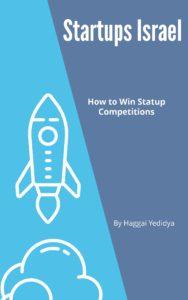
4 Comments
Inessa · February 5, 2020 at 8:59 am
As one who won an Israeli/Chinese startup competition, I can say that the article gives important and priceless information. If I had this information in the past, it would certainly have saved me a lot of unnecessary effort.
The article is very interesting. I really enjoyed reading it and learning from it. It is written very well, easy to read and with lots of insights.
Thank you.
Yulia Katz · February 5, 2020 at 7:10 pm
Good evening, Haggai!.
Your story is so engaging and very cool, well written , filled with good recommendations and valuable lessons.
I read curiously.
It can also be very useful for startups for raising money from investors .. not just competitions …
Thanks for sharing. Just great! Good luck 🙂
Yulia Keler · April 4, 2020 at 11:50 pm
Great article full of insights, very engaging approach! As a person that participated in startup competitions, I can say that it has a lot of valuable tips I wish I knew in advance! Than you for sharing your experience, Haggai!
user · May 31, 2020 at 3:31 pm
Like!! Great article post.Really thank you! Really Cool.